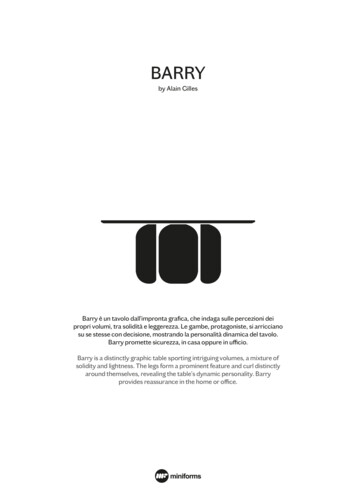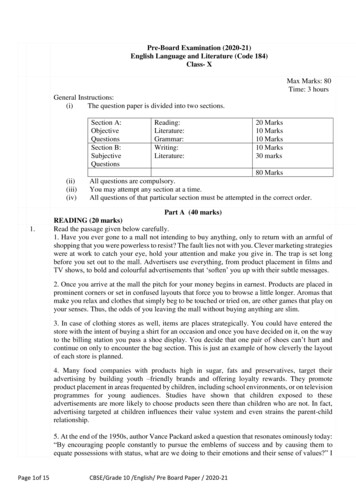
Transcription
The Unbearable Lightness Of BeingByMilan KunderaCourtesy:Shahid RiazIslamabad – rProfileAction.ns?id ebdaae62-b650-4f30-99a4-376c0a084226
"The Unbearable Lightness Of Being" By Milan Kundera2PART ONELightness and WeightThe idea of eternal return is a mysterious one, and Nietzsche has often perplexed otherphilosophers with it: to think that everything recurs as we once experienced it, and thatthe recurrence itself recurs ad infinitum! What does this mad myth signify?Putting it negatively, the myth of eternal return states that a life which disappears onceand for all, which does not return, is like a shadow, without weight, dead in advance,and whether it was horrible, beautiful, or sublime, its horror, sublimity, and beauty meannothing. We need take no more note of it than of a war between two African kingdomsin the fourteenth century, a war that altered nothing in the destiny of the world, even if ahundred thousand blacks perished in excruciating torment.Will the war between two African kingdoms in the fourteenth century itself be altered if itrecurs again and again, in eternal return?It will: it will become a solid mass, permanently protuberant, its inanity irreparable.If the French Revolution were to recur eternally, French historians would be less proudof Robespierre. But because they deal with something that will not return, the bloodyyears of the Revolution have turned into mere words, theories, and discussions, havebecome lighter than feathers, frightening no one. There is an infinite difference betweena Robespierre who occurs only once in history and a Robespierre who eternally returns,chopping off French heads.Let us therefore agree that the idea of eternal return implies a perspective from whichthings appear other than as we know them: they appear without the mitigatingcircumstance of their transitory nature. This mitigating circumstance prevents us fromcoming to a verdict. For how can we condemn something that is ephemeral, in transit?In the sunset of dissolution, everything is illuminated by the aura of nostalgia, even theguillotine.Not long ago, I caught myself experiencing a most incredible sensation. Leafing througha book on Hitler, I was touched by some of his portraits: they reminded me of mychildhood. I grew up during the war; several members of my family perished in Hitler'sconcentration camps; but what were their deaths compared with the memories of a lostperiod in my life, a period that would never return?This reconciliation with Hitler reveals the profound moral perversity of a world that restsessentially on the nonexistence of return, for in this world everything is pardoned inadvance and therefore everything cynically permitted.
"The Unbearable Lightness Of Being" By Milan Kundera3If every second of our lives recurs an infinite number of times, we are nailed to eternityas Jesus Christ was nailed to the cross. It is a terrifying prospect. In the world of eternalreturn the weight of unbearable responsibility lies heavy on every move we make. Thatis why Nietzsche called the idea of eternal return the heaviest of burdens (dasschwerste Gewicht).If eternal return is the heaviest of burdens, then our lives can stand out against it in alltheir splendid lightness.But is heaviness truly deplorable and lightness splendid?The heaviest of burdens crushes us, we sink beneath it, it pins us to the ground. But inthe love poetry of every age, the woman longs to be weighed down by the man's body.The heaviest of burdens is therefore simultaneously an image of life's most intensefulfillment. The heavier the burden, the closer our lives come to the earth, the more realand truthful they become.Conversely, the absolute absence of a burden causes man to be lighter than air, to soarinto the heights, take leave of the earth and his earthly being, and become only halfreal, his movements as free as they are insignificant.What then shall we choose? Weight or lightness?Parmenides posed this very question in the sixth century before Christ. He saw theworld divided into pairs of opposites:light/darkness, fineness/coarseness, warmth/cold, being/non-being. One half of theopposition he called positive (light, fineness, warmth, being), the other negative. Wemight find this division into positive and negative poles childishly simple except for onedifficulty: which one is positive, weight or lightness?Parmenides responded: lightness is positive, weight negative.Was he correct or not?That is the question. The only certainty is: the lightness/weight opposition is the mostmysterious, most ambiguous of all.I have been thinking about Tomas for many years. But only in the light of thesereflections did I see him clearly. I saw him standing at the window of his flat and lookingacross the courtyard at the opposite walls, not knowing what to do.He had first met Tereza about three weeks earlier in a small Czech town. They hadspent scarcely an hour together. She had accompanied him to the station and waitedwith him until he boarded the train. Ten days later she paid him a visit. They made lovethe day she arrived. That night she came down with a fever and stayed a whole week inhis flat with the flu.He had come to feel an inexplicable love for this all but complete stranger; she seemeda child to him, a child someone had put in a bulrush basket daubed with pitch and sentdownstream for Tomas to fetch at the riverbank of his bed.
"The Unbearable Lightness Of Being" By Milan Kundera4She stayed with him a week, until she was well again, then went back to her town,some hundred and twenty-five miles from Prague. And then came the time I have justspoken of and see as the key to his life: Standing by the window, he looked out over thecourtyard at the walls opposite him and deliberated.Should he call her back to Prague for good? He feared the responsibility. If he invitedher to come, then come she would, and offer him up her life.Or should he refrain from approaching her? Then she would remain a waitress in ahotel restaurant of a provincial town and he would never see her again.Did he want her to come or did he not?He looked out over the courtyard at the opposite walls, seeking an answer.He kept recalling her lying on his bed; she reminded him of no one in his former life.She was neither mistress nor wife. She was a child whom he had taken from a bulrushbasket that had been daubed with pitch and sent to the riverbank of his bed. She fellasleep. He knelt down next to her. Her feverous breath quickened and she gave out aweak moan. He pressed his face to hers and whispered calming words into her sleep.After a while he felt her breath return to normal and her face rise unconsciously to meethis. He smelled the delicate aroma of her fever and breathed it in, as if trying to gluthimself with the intimacy of her body. And all at once he fancied she had been with himfor many years and was dying. He had a sudden clear feeling that he would not surviveher death. He would lie down beside her and want to die with her. He pressed his faceinto the pillow beside her head and kept it there for a long time.Now he was standing at the window trying to call that moment to account. What could ithave been if not love declaring itself to him?But was it love? The feeling of wanting to die beside her was clearly exaggerated: hehad seen her only once before in his life! Was it simply the hysteria of a man who,aware deep down of his inaptitude for love, felt the self-deluding need to simulate it?His unconscious was so cowardly that the best partner it could choose for its littlecomedy was this miserable provincial waitress with practically no chance at all to enterhis life!Looking out over the courtyard at the dirty walls, he realized he had no idea whether itwas hysteria or love.And he was distressed that in a situation where a real man would instantly have knownhow to act, he was vacillating and therefore depriving the most beautiful moments hehad ever experienced (kneeling at her bed and thinking he would not survive her death)of their meaning.He remained annoyed with himself until he realized that not knowing what he wantedwas actually quite natural.
"The Unbearable Lightness Of Being" By Milan Kundera5We can never know what to want, because, living only one life, we can neither compareit with our previous lives nor perfect it in our lives to come.Was it better to be with Tereza or to remain alone?There is no means of testing which decision is better, because there is no basis forcomparison. We live everything as it comes, without warning, like an actor going oncold. And what can life be worth if the first rehearsal for life is life itself? That is why lifeis always like a sketch. No, sketch is not quite the word, because a sketch is an outlineof something, the groundwork for a picture, whereas the sketch that is our life is asketch for nothing, an outline with no picture.Einmal ist keinmal, says Tomas to himself. What happens but once, says the Germanadage, might as well not have happened at all. If we have only one life to live,we mightas well not have lived at all.But then one day at the hospital, during a break between operations, a nurse called himto the telephone. He heard Tereza's voice coming from the receiver. She had phonedhim from the railway station. He was overjoyed. Unfortunately, he had something onthat evening and could not invite her to his place until the next day. The moment hehung up, he reproached himself for not telling her to go straight there. He had timeenough to cancel his plans, after all! He tried to imagine what Tereza would do inPrague during the thirty-six long hours before they were to meet, and had half a mind tojump into his car and drive through the streets looking for her.She arrived the next evening, a handbag dangling from her shoulder, looking moreelegant than before. She had a thick book under her arm. It was Anna Karenina. Sheseemed in a good mood, even a little boisterous, and tried to make him think she hadjust happened to drop in, things had just worked out that way: she was in Prague onbusiness, perhaps (at this point she became rather vague) to find a job.Later, as they lay naked and spent side by side on the bed, he asked her where shewas staying. It was night by then, and he offered to drive her there. Embarrassed, sheanswered that she still had to find a hotel and had left her suitcase at the station.Only two days ago, he had feared that if he invited her to Prague she would offer himup her life. When she told him her suitcase was at the station, he immediately realizedthat the suitcase contained her life and that she had left it at the station only until shecould offer it up to him.The two of them got into his car, which was parked in front of the house, and drove tothe station. There he claimed the suitcase (it was large and enormously heavy) andtook it and her home.How had he come to make such a sudden decision when for nearly a fortnight he hadwavered so much that he could not even bring himself to send a postcard asking herhow she was?
"The Unbearable Lightness Of Being" By Milan Kundera6He himself was surprised. He had acted against his principles. Ten years earlier, whenhe had divorced his wife, he celebrated the event the way others celebrate a marriage.He understood he was not born to live side by side with any woman and could be fullyhimself only as a bachelor. He tried to design his life in such a way that no womancould move in with a suitcase. That was why his flat had only the one bed. Even thoughit was wide enough, Tomas would tell his mistresses that he was unable to fall asleepwith anyone next to him, and drive them home after midnight. And so it was not the fluthat kept him from sleeping with Tereza on her first visit. The first night he had slept inhis large armchair, and the rest of that week he drove each night to the hospital, wherehe had a cot in his office.But this time he fell asleep by her side. When he woke up the next morning, he foundTereza, who was still asleep, holding his hand. Could they have been hand in hand allnight? It was hard to believe.And while she breathed the deep breath of sleep and held his hand (firmly: he wasunable to disengage it from her grip), the enormously heavy suitcase stood by the bed.He refrained from loosening his hand from her grip for fear of waking her, and turnedcarefully on his side to observe her better.Again it occurred to him that Tereza was a child put in a pitch-daubed bulrush basketand sent downstream. He couldn't very well let a basket with a child in it float down astormy river! If the Pharaoh's daughter hadn't snatched the basket carrying little Mosesfrom the waves, there would have been no Old Testament, no civilization as we nowknow it! How many ancient myths begin with the rescue of an abandoned child! IfPolybus hadn't taken in the young Oedipus, Sophocles wouldn't have written his mostbeautiful tragedy!Tomas did not realize at the time that metaphors are dangerous. Metaphors are not tobe trifled with. A single metaphor can give birth to love.He lived a scant two years with his wife, and they had a son. At the divorceproceedings, the judge awarded the infant to its mother and ordered Tomas to pay athird of his salary for its support. He also granted him the right to visit the boy everyother week.But each time Tomas was supposed to see him, the boy's mother found an excuse tokeep him away. He soon realized that bringing them expensive gifts would make thingsa good deal easier, that he was expected to bribe the mother for the son's love. He sawa future of quixotic attempts to inculcate his views in the boy, views opposed in everyway to the mother's. The very thought of it exhausted him. When, one Sunday, theboy's mother again canceled a scheduled visit, Tomas decided on the spur of themoment never to see him again.Why should he feel more for that child, to whom he was bound by nothing but a singleimprovident night, than for any other? He would be scrupulous about paying support; he
"The Unbearable Lightness Of Being" By Milan Kundera7just didn't want anybody making him fight for his son in the name of paternalsentiments!Needless to say, he found no sympathizers. His own parents condemned him roundly:if Tomas refused to take an interest in his son, then they, Tomas's parents, would nolonger take an interest in theirs. They made a great show of maintaining good relationswith their daughter-in-law and trumpeted their exemplary stance and sense of justice.Thus in practically no time he managed to rid himself of wife, son, mother, and father.The only thing they bequeathed to him was a fear of women. Tomas desired but fearedthem. Needing to create a compromise between fear and desire, he devised what hecalled erotic friendship. He would tell his mistresses: the only relationship that canmake both partners happy is one in which sentimentality has no place and neitherpartner makes any claim on the life and freedom of the other.To ensure that erotic friendship never grew into the aggression of love, he would meeteach of his long-term mistresses only at intervals. He considered this method flawlessand propagated it among his friends: The important thing is to abide by the rule ofthrees. Either you see a woman three times in quick succession and then never again,or you maintain relations over the years but make sure that the rendezvous are at leastthree weeks apart.The rule of threes enabled Tomas to keep intact his liaisons with some women whilecontinuing to engage in short-term affairs with many others. He was not alwaysunderstood. The woman who understood him best was Sabina. She was a painter. Thereason I like you, she would say to him, is you're the complete opposite of kitsch. In thekingdom of kitsch you would be a monster.It was Sabina he turned to when he needed to find a job for Tereza in Prague.Following the unwritten rules of erotic friendship, Sabina promised to do everything inher power, and before long she had in fact located a place for Tereza in the darkroomof an illustrated weekly. Although her new job did not require any particularqualifications, it raised her status from waitress to member of the press. When Sabinaherself introduced Tereza to everyone on the weekly, Tomas knew he had never had abetter friend as a mistress than Sabina.The unwritten contract of erotic friendship stipulated that Tomas should exclude all lovefrom his life. The moment he violated that clause of the contract, his other mistresseswould assume inferior status and become ripe for insurrection.Accordingly, he rented a room for Tereza and her heavy suitcase. He wanted to be ableto watch over her, protect her, enjoy her presence, but felt no need to change his wayof life. He did not want word to get out that Tereza was sleeping at his place: spendingthe night together was the corpus delicti of love.
"The Unbearable Lightness Of Being" By Milan Kundera8He never spent the night with the others. It was easy enough if he was at their place: hecould leave whenever he pleased. It was worse when they were at his and he had toexplain that come midnight he would have to drive them home because he was aninsomniac and found it impossible to fall asleep in close proximity to another person.Though it was not far from the truth, he never dared tell them the whole truth:after making love he had an uncontrollable craving to be by himself; waking in themiddle of the night at the side of an alien body was distasteful to him, rising in themorning with an intruder repellent; he had no desire to be overheard brushing his teethin the bathroom, nor was he enticed by the thought of an intimate breakfast.That is why he was so surprised to wake up and find Tereza squeezing his hand tightly.Lying there looking at her, he could not quite understand what had happened. But as heran through the previous few hours in his mind, he began to sense an aura of hithertounknown happiness emanating from them.From that time on they both looked forward to sleeping together. I might even say thatthe goal of their lovemaking was not so much pleasure as the sleep that followed it. Sheespecially was affected. Whenever she stayed overnight in her rented room (whichquickly became only an alibi for Tomas), she was unable to fall asleep; in his arms shewould fall asleep no matter how wrought up she might have been. He would whisperimpromptu fairy tales about her, or gibberish, words he repeated monotonously, wordssoothing or comical, which turned into vague visions lulling her through the first dreamsof the night. He had complete control over her sleep: she dozed off at the second hechose.While they slept, she held him as on the first night, keeping a firm grip on wrist, finger,or ankle. If he wanted to move without waking her, he had to resort to artifice. Afterfreeing his finger (wrist, ankle) from her clutches, a process which, since she guardedhim carefully even in her sleep, never failed to rouse her partially, he would calm her byslipping an object into her hand (a rolled-up pajama top, a slipper, a book), which shethen gripped as tightly as if it were a part of his body.Once, when he had just lulled her to sleep but she had gone no farther than dream'santechamber and was therefore still responsive to him, he said to her, Good-bye, I'mgoing now. Where? she asked in her sleep. Away, he answered sternly. Then I'm goingwith you, she said, sitting up in bed. No, you can't. I'm going away for good, he said,going out into the hall. She stood up and followed him out, squinting. She was nakedbeneath her short nightdress. Her face was blank, expressionless, but she movedenergetically. He walked through the hall of the flat into the hall of the building (the hallshared by all the occupants), closing the door in her face. She flung it open andcontinued to follow him, convinced in her sleep that he meant to leave her for good andshe had to stop him. He walked down the stairs to the first landing and waited for herthere. She went down after him, took him by the hand, and led him back to bed.Tomas came to this conclusion: Making love with a woman and sleeping with a womanare two separate passions, not merely different but opposite. Love does not make itselffelt in the desire for copulation (a desire that extends to an infinite number of women)but in the desire for shared sleep (a desire limited to one woman).
"The Unbearable Lightness Of Being" By Milan Kundera9In the middle of the night she started moaning in her sleep. Tomas woke her up, butwhen she saw his face she said, with hatred in her voice, Get away from me! Get awayfrom me! Then she told him her dream: The two of them and Sabina had been in a bigroom together. There was a bed in the middle of the room. It was like a platform in thetheater. Tomas ordered her to stand in the corner while he made love to Sabina. Thesight of it caused Tereza intolerable suffering. Hoping to alleviate the pain in her heartby pains of the flesh, she jabbed needles under her fingernails. It hurt so much, shesaid, squeezing her hands into fists as if they actually were wounded.He pressed her to him, and she gradually (trembling violently for a long time) fell asleepin his arms.Thinking about the dream the next day, he remembered something. He opened a deskdrawer and took out a packet of letters Sabina had written to him. He was not long infinding the following passage: I want to make love to you in my studio. It will be like astage surrounded by people. The audience won't be allowed up close, but they won't beable to take their eyes off us.The worst of it was that the letter was dated. It was quite recent, written long afterTereza had moved in with Tomas.So you've been rummaging in my letters!She did not deny it. Throw me out, then!But he did not throw her out. He could picture her pressed against the wall of Sabina'sstudio jabbing needles up under her nails. He took her fingers between his hands andstroked them, brought them to his lips and kissed them, as if they still had drops ofblood on them.But from that time on, everything seemed to conspire against him. Not a day went bywithout her learning something about his secret life.At first he denied it all. Then, when the evidence became too blatant, he argued that hispolygamous way of life did not in the least run counter to his love for her. He wasinconsistent: first he disavowed his infidelities, then he tried to justify them.Once he was saying good-bye after making a date with a woman on the phone, whenfrom the next room came a strange sound like the chattering of teeth.By chance shehad come home without his realizing it. She was pouring something from a medicinebottle down her throat, and her hand shook so badly the glass bottle clicked against herteeth.He pounced on her as if trying to save her from drowning. The bottle fell to the floor,spotting the carpet with valerian drops. She put up a good fight, and he had to keep herin a straitjacket-like hold for a quarter of an hour before he could calm her.He knew he was in an unjustifiable situation, based as it was on complete inequality.
"The Unbearable Lightness Of Being" By Milan Kundera 10One evening, before she discovered his correspondence with Sabina, they had gone toa bar with some friends to celebrate Tereza's new job. She had been promoted at theweekly from darkroom technician to staff photographer. Because he had never beenmuch for dancing, one of his younger colleagues took over. They made a splendidcouple on the dance floor, and Tomas found her more beautiful than ever. He looked onin amazement at the split-second precision and deference with which Terezaanticipated her partner's will. The dance seemed to him a declaration that her devotion,her ardent desire to satisfy his every whim, was not necessarily bound to his person,that if she hadn't met Tomas, she would have been ready to respond to the call of anyother man she might have met instead. He had no difficulty imagining Tereza and hisyoung colleague as lovers. And the ease with which he arrived at this fiction woundedhim. He realized that Tereza's body was perfectly thinkable coupled with any malebody, and the thought put him in a foul mood. Not until late that night, at home, did headmit to her he was jealous.This absurd jealousy, grounded as it was in mere hypotheses, proved that heconsidered her fidelity an unconditional postulate of their relationship. How then couldhe begrudge her her jealousy of his very real mistresses?During the day, she tried (though with only partial success) to believe what Tomas toldher and to be as cheerful as she had been before. But her jealousy thus tamed by dayburst forth all the more savagely in her dreams, each of which ended in a wail he couldsilence only by waking her.Her dreams recurred like themes and variations or television series. For example, sherepeatedly dreamed of cats jumping at her face and digging their claws into her skin.We need not look far for an interpretation: in Czech slang the word cat means a prettywoman. Tereza saw herself threatened by women, all women. All women werepotential mistresses for Tomas, and she feared them all.In another cycle she was being sent to her death. Once, when he woke her as shescreamed in terror in the dead of night, she told him about it. I was at a large indoorswimming pool. There were about twenty of us. All women. We were naked and had tomarch around the pool. There was a basket hanging from the ceiling and a manstanding in the basket. The man wore a broad-brimmed hat shading his face, but Icould see it was you. You kept giving us orders. Shouting at us. We had to sing as wemarched, sing and do kneebends. If one of us did a bad kneebend, you would shoother with a pistol and she would fall dead into the pool. Which made everybody laughand sing even louder. You never took your eyes off us, and the minute we didsomething wrong, you would shoot. The pool was full of corpses floating just below thesurface. And I knew I lacked the strength to do the next kneebend and you were goingto shoot me!In a third cycle she was dead.bying in a hearse as big as a furniture van, she was surrounded by dead women. Therewere so many of them that the back door would not close and several legs dangled out.But I'm not dead! Tereza cried. I can still feel!
"The Unbearable Lightness Of Being" By Milan Kundera 11So can we, the corpses laughed.They laughed the same laugh as the live women who used to tell her cheerfully it wasperfectly normal that one day she would have bad teeth, faulty ovaries, and wrinkles,because they all had bad teeth, faulty ovaries, and wrinkles. Laughing the same laugh,they told her that she was dead and it was perfectly all right!Suddenly she felt a need to urinate. You see, she cried. I need to pee. That's proofpositive I'm not dead!But they only laughed again. Needing to pee is perfectly normal! they said. You'll go onfeeling that kind of thing for a long time yet. Like a person who has an arm cut off andkeeps feeling it's there. We may not have a drop of pee left in us, but we keep needingto pee.Tereza huddled against Tomas in bed. And the way they talked to me! Like old friends,people who'd known me forever. I was appalled at the thought of having to stay withthem forever.All languages that derive from Latin form the word compassion by combining the prefixmeaning with (corn-) and the root meaning suffering (Late Latin, passio). In other languages—Czech, Polish, German, and Swedish, for instance— this word is translatedby a noun formed of an equivalent prefix combined with the word that means feeling(Czech, sou-cit; Polish, wspol-czucie; German, Mit-gefuhl; Swedish, med-kansia).In languages that derive from Latin, compassion means: we cannot look on coolly asothers suffer; or, we sympathize with those who suffer. Another word withapproximately the same meaning, pity (French, pitie; Italian, pieta; etc.), connotes acertain condescension towards the sufferer. To take pity on a woman means that weare better off than she, that we stoop to her level, lower ourselves.That is why the word compassion generally inspires suspicion; it designates what isconsidered an inferior, second-rate sentiment that has little to do with love. To lovesomeone out of compassion means not really to love.In languages that form the word compassion not from the root suffering but from theroot feeling, the word is used in approximately the same way, but to contend that itdesignates a bad or inferior sentiment is difficult. The secret strength of its etymologyfloods the word with another light and gives it a broader meaning: to have compassion(co-feeling) means not only to be able to live with the other's misfortune but also to feelwith him any emotion—joy, anxiety, happiness, pain. This kind of compassion (in thesense of souc/r, wspofczucie, Mitgefuhl, medkansia) therefore signifies the maximalcapacity of affective imagination, the art of emotional telepathy. In the hierarchy ofsentiments, then, it is supreme.By revealing to Tomas her dream about jabbing needles under her fingernails, Terezaunwittingly revealed that she had gone through his desk. If Tereza had been any other
"The Unbearable Lightness Of Being" By Milan Kundera 12woman, Tomas would never have spoken to her again. Aware of that, Tereza said tohim, Throw me out! But instead of throwing her out, he seized her hand and kissed thetips of her fingers, because at that moment he himself felt the pain under her fingernailsas surely as if the nerves of her fingers led straight to his own brain.Anyone who has failed to benefit from the Devil's gift of compassion (co-feeling) willcondemn Tereza coldly for her deed, because privacy is sacred and drawers containingintimate correspondence are not to be opened. But because compassion was Tomas'sfate (or curse), he felt that he himself had knelt before the open desk dr
nothing. We need take no more note of it than of a war between two African kingdoms in the fourteenth century, a war that altered nothing in the destiny of the world, even if a hundred thousand blacks perished in excruciating torment. Will the war between two African k










